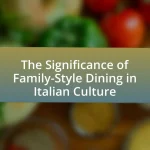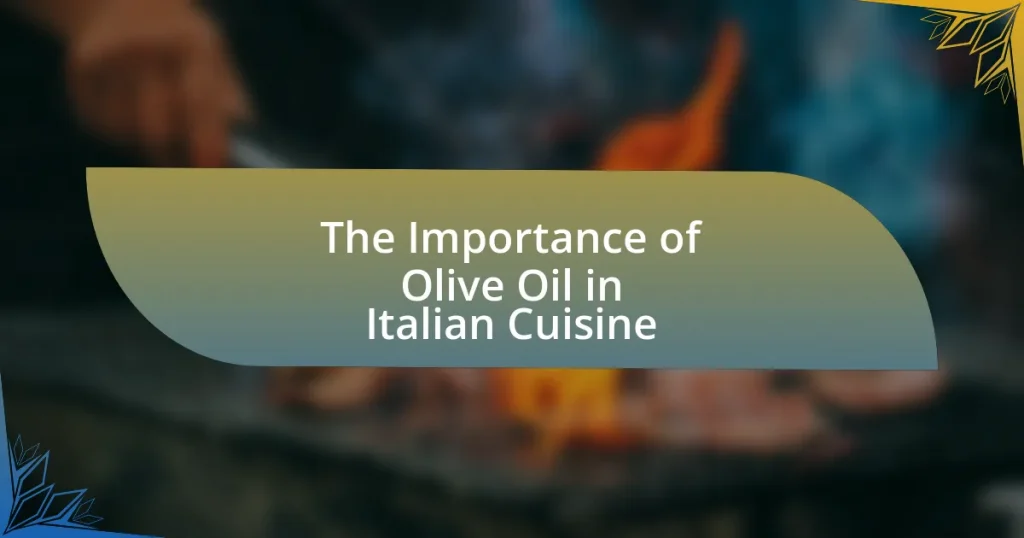Olive oil is a fundamental ingredient in Italian cuisine, serving as a primary source of flavor, fat, and health benefits. It is utilized in various cooking methods, including sautéing, dressing salads, and enhancing traditional dishes like pasta and sauces. The article explores the historical significance of olive oil in Italy, its health benefits linked to the Mediterranean diet, and the importance of selecting high-quality extra virgin olive oil. Additionally, it addresses common misconceptions about olive oil, its role in enhancing flavors, and best practices for its use in cooking.
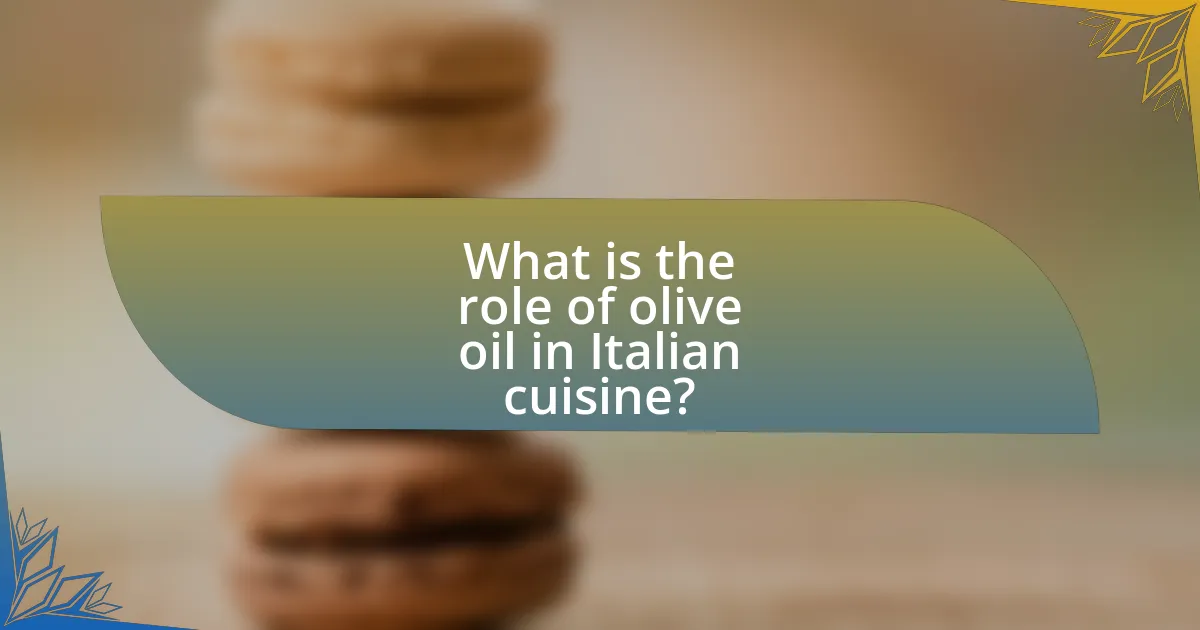
What is the role of olive oil in Italian cuisine?
Olive oil serves as a fundamental ingredient in Italian cuisine, acting as a primary source of flavor, fat, and health benefits. It is used in various cooking methods, including sautéing, dressing salads, and drizzling over finished dishes, enhancing both taste and nutritional value. The Mediterranean diet, which is prevalent in Italy, emphasizes the use of olive oil for its monounsaturated fats, which are linked to heart health. Additionally, Italy is one of the largest producers of olive oil globally, with regions like Tuscany and Puglia known for their high-quality extra virgin olive oils, which are integral to traditional recipes and culinary practices.
How is olive oil used in traditional Italian dishes?
Olive oil is a fundamental ingredient in traditional Italian dishes, serving as a primary cooking fat, dressing, and flavor enhancer. It is commonly used for sautéing vegetables, drizzling over pasta, and as a base for sauces, such as marinara and pesto. The quality of olive oil, particularly extra virgin olive oil, is crucial as it contributes to the dish’s flavor profile and health benefits, including antioxidants and healthy fats. Historical evidence shows that olive oil has been integral to Italian cooking for centuries, with regions like Tuscany and Liguria renowned for their high-quality oils, which are often featured prominently in local recipes.
What are the most popular dishes that feature olive oil?
The most popular dishes that feature olive oil include pasta dishes, salads, and grilled vegetables. Pasta dishes such as spaghetti aglio e olio highlight the use of olive oil as a primary ingredient, providing flavor and richness. Salads like Caprese salad utilize olive oil as a dressing, enhancing the freshness of tomatoes and mozzarella. Grilled vegetables, often drizzled with olive oil before cooking, benefit from its ability to enhance taste and texture. Olive oil is integral to these dishes, reflecting its significance in Italian cuisine.
How does olive oil enhance the flavors of Italian cuisine?
Olive oil enhances the flavors of Italian cuisine by providing a rich, fruity, and peppery profile that complements various ingredients. Its high monounsaturated fat content allows it to carry and amplify the natural flavors of vegetables, meats, and herbs, creating a harmonious balance in dishes. For instance, extra virgin olive oil, which is cold-pressed and retains more nutrients, is often drizzled over salads or used in dressings, intensifying the freshness of the ingredients. Additionally, studies have shown that the phenolic compounds in olive oil contribute to its flavor complexity, making it a key component in traditional Italian recipes such as pasta sauces and marinades.
Why is olive oil considered a staple in Italian cooking?
Olive oil is considered a staple in Italian cooking due to its integral role in flavoring, cooking techniques, and health benefits. It serves as a primary fat for sautéing, dressing salads, and enhancing the taste of various dishes, making it essential in traditional recipes. The Mediterranean diet, which emphasizes olive oil, has been linked to numerous health benefits, including reduced risk of heart disease, as supported by studies such as the PREDIMED trial, which highlighted the positive effects of a diet rich in olive oil on cardiovascular health. This combination of culinary versatility and health advantages solidifies olive oil’s status as a foundational ingredient in Italian cuisine.
What historical significance does olive oil have in Italy?
Olive oil holds significant historical importance in Italy as a staple of its agricultural and culinary heritage. Since ancient times, particularly during the Roman Empire, olive oil was not only a vital food source but also used for medicinal purposes, religious rituals, and as a fuel for lamps. The cultivation of olive trees and the production of olive oil have been integral to Italian culture, with regions like Tuscany and Puglia being renowned for their high-quality oils. Historical texts, such as those by Pliny the Elder, document the value placed on olive oil, emphasizing its role in trade and daily life. This long-standing tradition has shaped Italy’s culinary identity, making olive oil a fundamental ingredient in Italian cuisine.
How has the use of olive oil evolved in Italian cuisine over time?
The use of olive oil in Italian cuisine has evolved from a basic cooking fat to a fundamental ingredient that defines regional dishes and culinary traditions. Historically, olive oil was primarily used for frying and preserving food, but over time, its role expanded to include dressings, marinades, and finishing oils, enhancing flavors and textures in various dishes. By the Renaissance, olive oil became a symbol of wealth and sophistication, leading to its incorporation in gourmet cooking and the establishment of high-quality production standards. Today, Italy is one of the largest producers of olive oil, with a focus on extra virgin varieties, which are celebrated for their health benefits and rich flavors, reflecting a deep cultural appreciation for this ingredient in both traditional and modern Italian cuisine.
What types of olive oil are commonly used in Italian cuisine?
Extra virgin olive oil is the most commonly used type of olive oil in Italian cuisine. This oil is prized for its high quality, rich flavor, and health benefits, making it a staple in various Italian dishes, from dressings to marinades and cooking. Extra virgin olive oil is produced from the first cold pressing of olives, ensuring minimal processing and retaining the natural flavors and nutrients. Additionally, light olive oil is also used in Italian cooking, particularly for frying and baking, due to its higher smoke point compared to extra virgin olive oil.
What are the differences between extra virgin, virgin, and refined olive oil?
Extra virgin olive oil is the highest quality, made from pure, cold-pressed olives, with an acidity level of less than 0.8%. Virgin olive oil is also made from olives but has a slightly higher acidity level, up to 2%, and may have minor defects in flavor. Refined olive oil undergoes processing that removes impurities and acidity, resulting in a neutral flavor and higher smoke point, but it lacks the distinct taste and health benefits found in the unrefined varieties. These distinctions are crucial for culinary applications, particularly in Italian cuisine, where flavor and quality are paramount.
How do different types of olive oil affect cooking methods and flavors?
Different types of olive oil significantly affect cooking methods and flavors due to their varying smoke points and flavor profiles. Extra virgin olive oil, with its low smoke point around 375°F, is ideal for dressings and low-heat cooking, preserving its robust flavor and health benefits. In contrast, refined olive oil, which has a higher smoke point of about 465°F, is suitable for high-heat cooking methods like frying, as it remains stable without imparting strong flavors. Additionally, the flavor intensity of olive oil can range from fruity and peppery in extra virgin varieties to milder in refined oils, influencing the overall taste of dishes. Studies indicate that the choice of olive oil can enhance the sensory attributes of food, making it a crucial element in Italian cuisine.
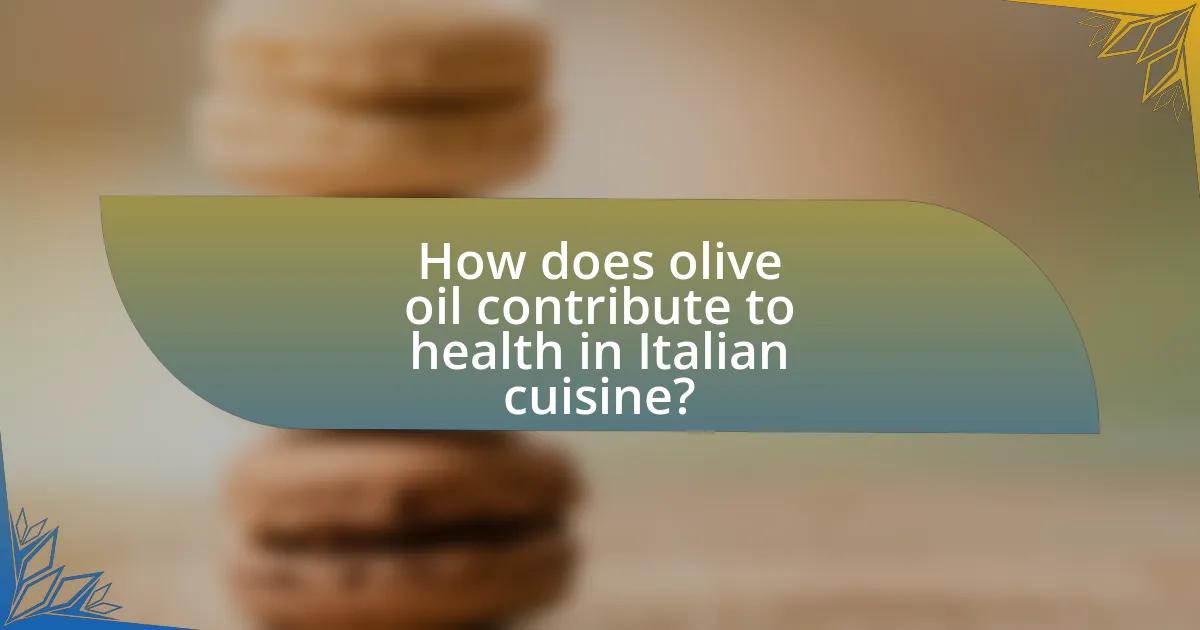
How does olive oil contribute to health in Italian cuisine?
Olive oil contributes to health in Italian cuisine primarily through its high content of monounsaturated fats, which are beneficial for heart health. Studies indicate that the consumption of olive oil is associated with a reduced risk of cardiovascular diseases, as it helps lower bad cholesterol levels while increasing good cholesterol. Additionally, olive oil is rich in antioxidants, particularly vitamin E and polyphenols, which combat oxidative stress and inflammation in the body. Research published in the “Journal of Nutritional Biochemistry” highlights that these compounds can improve overall health and longevity, reinforcing the significance of olive oil in a balanced diet typical of Italian cuisine.
What are the health benefits of using olive oil in cooking?
Using olive oil in cooking offers numerous health benefits, primarily due to its high content of monounsaturated fats and antioxidants. Monounsaturated fats, such as oleic acid, can help reduce bad cholesterol levels, thereby lowering the risk of heart disease. Additionally, olive oil is rich in antioxidants like vitamin E and polyphenols, which have anti-inflammatory properties and may protect against chronic diseases. Research published in the “New England Journal of Medicine” indicates that a Mediterranean diet rich in olive oil can significantly reduce the risk of cardiovascular events. Thus, incorporating olive oil into cooking not only enhances flavor but also contributes to overall health and well-being.
How does olive oil compare to other cooking oils in terms of health?
Olive oil is generally considered healthier than many other cooking oils due to its high content of monounsaturated fats and antioxidants. Specifically, olive oil contains oleic acid, which has been linked to reduced inflammation and a lower risk of heart disease. In contrast, oils like canola and soybean oil often contain higher levels of polyunsaturated fats, which can contribute to inflammation when consumed in excess. Additionally, extra virgin olive oil is rich in polyphenols, which have been shown to provide various health benefits, including improved cardiovascular health and reduced oxidative stress. Studies, such as those published in the Journal of Nutritional Biochemistry, highlight that the Mediterranean diet, which emphasizes olive oil, is associated with lower rates of chronic diseases compared to diets high in other cooking oils.
What nutrients are found in olive oil that promote health?
Olive oil contains several nutrients that promote health, including monounsaturated fats, vitamin E, and antioxidants such as polyphenols. Monounsaturated fats, which make up a significant portion of olive oil, are known to improve heart health by reducing bad cholesterol levels. Vitamin E acts as a powerful antioxidant, protecting cells from oxidative stress and inflammation. Additionally, polyphenols found in olive oil have been linked to various health benefits, including anti-inflammatory properties and a reduced risk of chronic diseases. Studies have shown that the consumption of olive oil is associated with lower rates of cardiovascular disease and improved overall health outcomes.
Why is olive oil linked to the Mediterranean diet?
Olive oil is linked to the Mediterranean diet because it serves as a primary source of healthy fats, particularly monounsaturated fats, which are beneficial for heart health. The Mediterranean diet emphasizes whole foods, including fruits, vegetables, whole grains, and healthy fats, with olive oil being a staple ingredient in many traditional dishes. Research indicates that populations in Mediterranean regions, where olive oil is a dietary cornerstone, experience lower rates of cardiovascular diseases and longer life expectancy, supporting the health benefits associated with its consumption.
What role does olive oil play in the overall health benefits of the Mediterranean diet?
Olive oil is a fundamental component of the Mediterranean diet, contributing significantly to its health benefits. It is rich in monounsaturated fats, particularly oleic acid, which has been associated with reduced inflammation and improved heart health. Studies, such as those published in the New England Journal of Medicine, demonstrate that a diet high in olive oil can lower the risk of cardiovascular diseases by promoting healthy cholesterol levels and reducing blood pressure. Additionally, olive oil contains antioxidants, including vitamin E and polyphenols, which help combat oxidative stress and may lower the risk of chronic diseases. Thus, olive oil plays a crucial role in enhancing the overall health benefits of the Mediterranean diet through its heart-healthy fats and antioxidant properties.
How does the consumption of olive oil impact longevity and wellness?
The consumption of olive oil positively impacts longevity and wellness by reducing the risk of chronic diseases and promoting heart health. Studies indicate that diets rich in olive oil, particularly the Mediterranean diet, are associated with lower mortality rates. For instance, research published in the New England Journal of Medicine found that participants who consumed a Mediterranean diet supplemented with extra-virgin olive oil had a 30% lower risk of cardiovascular events compared to those on a low-fat diet. Additionally, olive oil contains antioxidants and anti-inflammatory compounds, such as oleocanthal, which contribute to overall health and may help prevent age-related diseases.
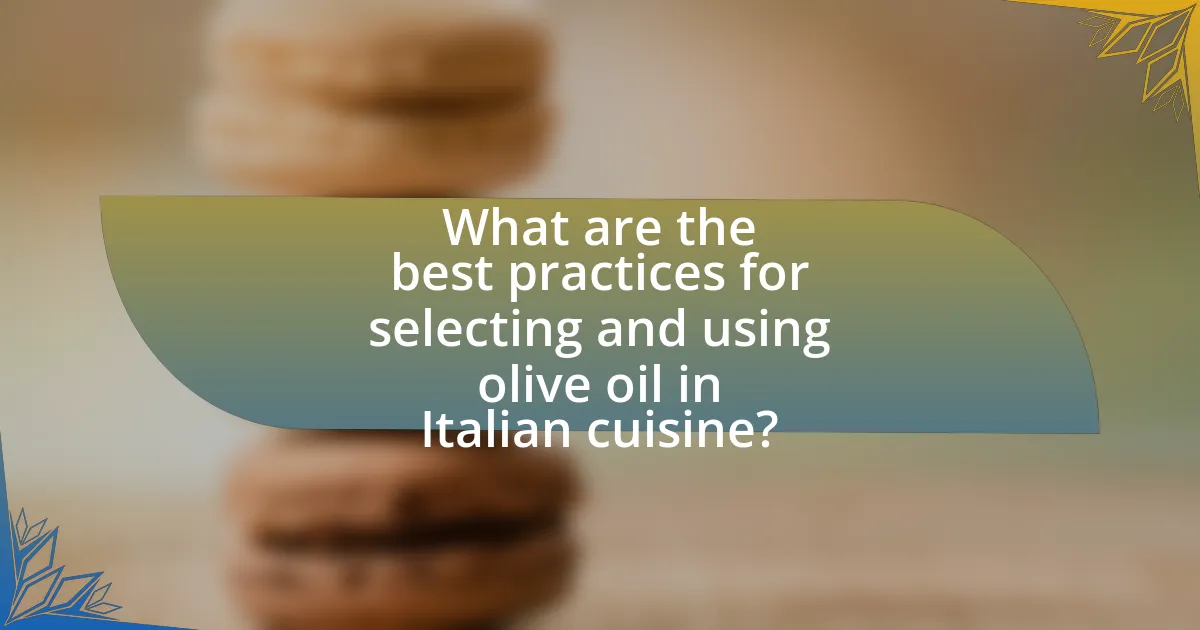
What are the best practices for selecting and using olive oil in Italian cuisine?
The best practices for selecting and using olive oil in Italian cuisine include choosing extra virgin olive oil, assessing its freshness, and understanding its flavor profile. Extra virgin olive oil is the highest quality, made from the first cold pressing of olives, ensuring superior taste and health benefits. Freshness is crucial; olive oil should ideally be consumed within 18 months of bottling, as it loses flavor and nutritional value over time. Additionally, understanding the flavor profile allows cooks to pair the oil with appropriate dishes; for instance, robust oils complement grilled meats, while milder oils suit delicate salads. These practices enhance the authenticity and quality of Italian dishes, aligning with traditional culinary standards.
How can one choose high-quality olive oil for cooking?
To choose high-quality olive oil for cooking, look for extra virgin olive oil, which is the highest grade and indicates minimal processing. Extra virgin olive oil must meet specific chemical standards and pass a sensory evaluation by trained tasters, ensuring it has no defects and possesses desirable flavors. Additionally, check for a harvest date on the label; fresher oil typically has better flavor and nutritional value. The oil should be stored in dark glass or tin containers to protect it from light, which can degrade quality. Lastly, consider the region of origin; oils from regions like Tuscany or Andalusia are often recognized for their superior quality due to strict production standards.
What labels and certifications should consumers look for?
Consumers should look for labels and certifications such as PDO (Protected Designation of Origin), PGI (Protected Geographical Indication), and organic certification when purchasing olive oil. PDO ensures that the oil is produced, processed, and prepared in a specific geographical area, adhering to strict quality standards, while PGI indicates that at least one stage of production occurs in the specified region. Organic certification guarantees that the olive oil is made from olives grown without synthetic pesticides or fertilizers, aligning with health and environmental standards. These certifications help consumers identify high-quality olive oils that reflect authentic Italian culinary traditions.
How can the freshness of olive oil be determined?
The freshness of olive oil can be determined by checking its harvest date, aroma, and taste. Fresh olive oil typically has a harvest date within the last 18 months, as oils older than this may lose their flavor and health benefits. A fresh olive oil should have a fruity aroma and a peppery or slightly bitter taste, indicating the presence of healthy polyphenols. Additionally, the oil should be free from any rancid or musty odors, which signal spoilage. These sensory characteristics are essential indicators of quality and freshness in olive oil.
What are some common misconceptions about olive oil in cooking?
Common misconceptions about olive oil in cooking include the belief that it cannot be used for high-heat cooking and that all olive oils are of equal quality. Many people think olive oil has a low smoke point, but extra virgin olive oil can withstand temperatures up to 410°F (210°C), making it suitable for sautéing and roasting. Additionally, not all olive oils are created equal; the quality varies significantly based on factors such as the type of olives used, the extraction process, and storage conditions. High-quality extra virgin olive oil contains beneficial antioxidants and healthy fats, while lower-quality oils may lack these properties.
Why is it a myth that all olive oils are the same?
It is a myth that all olive oils are the same because they vary significantly in quality, flavor, and production methods. Extra virgin olive oil, for instance, is made from the first cold pressing of olives and must meet strict chemical and sensory standards, while lower grades like pure olive oil may be refined and lack the same health benefits and flavor complexity. Studies show that extra virgin olive oil contains higher levels of antioxidants and healthy fats, which are diminished in lower-quality oils. Additionally, factors such as olive variety, region of cultivation, and harvest time contribute to the distinct characteristics of each oil, further debunking the myth of uniformity.
How can improper storage affect the quality of olive oil?
Improper storage significantly degrades the quality of olive oil by exposing it to light, heat, and air, which accelerate oxidation and rancidity. When olive oil is stored in clear glass bottles or in warm environments, it can lose its flavor, aroma, and nutritional value within a short period. Research indicates that olive oil should be kept in dark, cool places, ideally in opaque containers, to maintain its integrity. A study published in the Journal of Agricultural and Food Chemistry found that olive oil stored at room temperature in clear bottles experienced a 40% decrease in beneficial antioxidants after just six months.
What tips can enhance the use of olive oil in Italian dishes?
To enhance the use of olive oil in Italian dishes, select high-quality extra virgin olive oil for its rich flavor and health benefits. Extra virgin olive oil contains antioxidants and healthy fats, making it ideal for drizzling over finished dishes, such as pasta or salads, to elevate their taste. Additionally, using olive oil as a base for sautéing vegetables or proteins can infuse dishes with depth, as the oil’s flavor complements the ingredients. Studies show that incorporating olive oil into meals can improve heart health, as it is a key component of the Mediterranean diet, which is associated with lower rates of cardiovascular disease.


